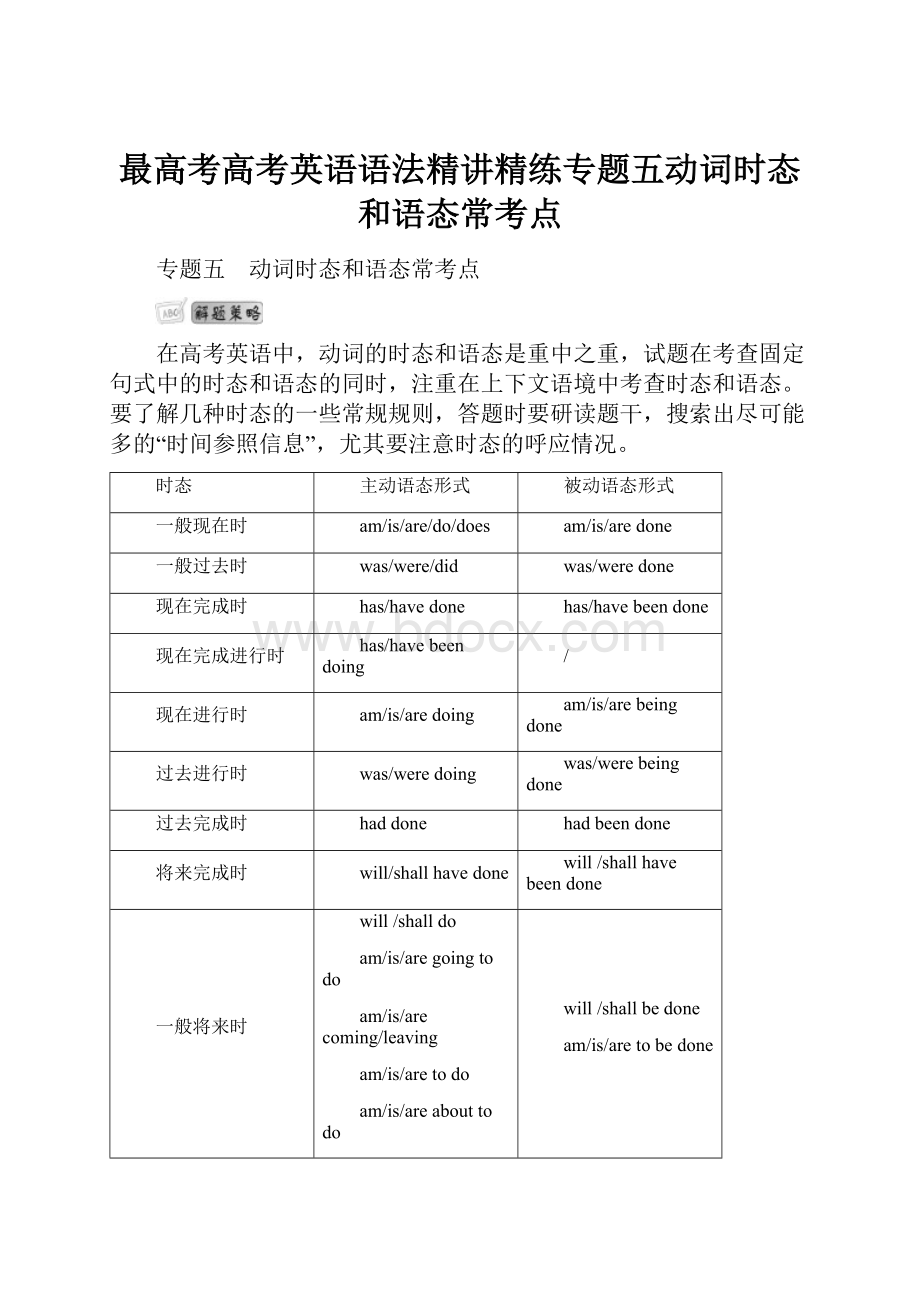最高考高考英语语法精讲精练专题五动词时态和语态常考点.docx
《最高考高考英语语法精讲精练专题五动词时态和语态常考点.docx》由会员分享,可在线阅读,更多相关《最高考高考英语语法精讲精练专题五动词时态和语态常考点.docx(19页珍藏版)》请在冰豆网上搜索。

最高考高考英语语法精讲精练专题五动词时态和语态常考点
专题五 动词时态和语态常考点
在高考英语中,动词的时态和语态是重中之重,试题在考查固定句式中的时态和语态的同时,注重在上下文语境中考查时态和语态。
要了解几种时态的一些常规规则,答题时要研读题干,搜索出尽可能多的“时间参照信息”,尤其要注意时态的呼应情况。
时态
主动语态形式
被动语态形式
一般现在时
am/is/are/do/does
am/is/aredone
一般过去时
was/were/did
was/weredone
现在完成时
has/havedone
has/havebeendone
现在完成进行时
has/havebeendoing
/
现在进行时
am/is/aredoing
am/is/arebeingdone
过去进行时
was/weredoing
was/werebeingdone
过去完成时
haddone
hadbeendone
将来完成时
will/shallhavedone
will/shallhavebeendone
一般将来时
will/shalldo
am/is/aregoingtodo
am/is/arecoming/leaving
am/is/aretodo
am/is/areabouttodo
will/shallbedone
am/is/aretobedone
过去将来时
woulddo
wasgoingtodo
wascoming/leaving
wastodo
wasabouttodo
wouldbedone
was/weretobedone
将来进行时
will/shallbedoing
/
一般现在时
一般现在时表示动作的经常性或真理;表示现状、性质、状态时多用系动词或状态动词;在条件、时间、让步状语从句中用一般现在时或现在完成时表示将来;表示预计或规定;方位副词或介词短语放在句首,主语是名词,且全部倒装时,用一般现在时表示正在发生的动作;还可使用于文学作品和文学评论中。
用所给词的适当形式填空:
①I'llgothereafterI________(finish)mywork.
②Thewaterwillbefurtherpollutedunlesssomemeasures________(take).
③Mytrain________(leave)at6:
30.
④Asnow________(expect)tocomenextweek.
⑤Onthewall________(hang)apicture.
⑥Thiskindofcloth________(wash)well.
⑦Don'ttakeitaway.It________(belong)tome.
⑧Hesaidwater________(boil)at100℃.
【答案】①finish ②aretaken ③leaves ④isexpected ⑤hangs ⑥washes ⑦belongs ⑧boils
一般过去时和现在完成时
一般过去时(标志词:
yesterday,justnow,lastyear,theotherday等)表示动作发生在过去,和现在毫无关系。
现在完成时(标志词:
since,inthepast/lastyears,just,recent(ly),lately,sofar=uptonow=upuntilnow=bynow,already,yet,several/many/...times)则强调的是对现在的影响和结果,动作到现在刚完成或还在继续。
请区别下列几组句子:
①HehaslivedinLondonforthreeyears.(现在还住在伦敦)
HelivedinLondonforthreeyears.(现在不在伦敦了)
②It'stwoyearssincehesmoked.(他不抽烟已两年了)
It'stwoyearssincehebegantosmoke.(他抽烟已有两年了)
③Thisisthefirst/second/...time(that)Ihave_visitedtheschool.
Thiswasthefirst/second/...timeIhad_visitedtheschool.
④Hewaswritingabooklastyear.(去年他在写一本书)
Hewroteabooklastyear.(去年他写了一本书)
⑤IthoughthewasanAmerican.(我原以为他是美国人)
IthinkheisanAmerican.(我想他是美国人)
用所给词的适当形式填空:
①—Ihaven'tseenyouforages.Haven'tyougraduatedfromcollege?
—Yes.I________(study)EnglishforfouryearsinNanjingUniversity.
②Where________you________(put)mybook?
Ican'tfinditanywhere.
③Althoughhehaslivedwithusforyears,he________(notleave)usmuchimpression.
④Mybrotherisanactor.He________(appear)inseveralfilmsinthepastfewyears.
⑤—LiPinmaynotcometonight.
—Buthe________(promise).
【答案】①studied ②have;put ③hasn'tleft ④hasappeared ⑤promised
过去完成时和将来完成时
过去完成时表示一件事情发生在过去,而另一件事情先于它发生(即表示“过去的过去”)。
常用的时间状语有:
bythen,bythattime,bytheendof,before2000,bythetime,hardly/scarcely/rarely...when...和nosooner...than...
[注]表示原打算做但未做的几种表达:
①Ihadhoped/expected/meant/intended/...todo...,but...
=Ihoped/expected/...tohavedone...,but...
=Iwouldlike/lovetohavedone...,but...
=Iwastohavedone...,but...
=Iwasgoingtodo...,but...
=Iwouldhavedone...,but...
②Iwascoming/leaving/arriving/...,but...
将来完成时表示到将来某一时间,某一动作将会完成,常用的时间状语为“by+将来的某个时间”。
如:
Theywillhavecompletedtheprojectbytheendofnextyear.
用所给词的适当形式填空:
①Helen________(leave)herkeysintheofficesoshehadtowaituntilherhusband________(come)home.
②I________(hope)tomeetMr.Thompsonthismorning,butIfoundnobodyleftintheroom.
③Bythetimehe________(return)home,theworkhadbeenfinished.
Bythetimehereturnshome,thework____________(finish).
④WeplantoreachtheNorthPoleinmid-July,andbythenwe____________(walk)forsixweeks.
【答案】①hadleft;came ②hadhoped ③returned;willhavebeenfinished ④willhavewalked
现在进行时,过去进行时,现在完成进行时和将来进行时
现在进行时表示现在正在进行的情况,计划、安排要做的事,还可以表示反复出现的动作,往往含有赞赏、厌恶、遗憾等情绪,常与always,continually,constantly连用;
过去进行时表示过去某一刻或一段时间内正在进行的动作,还可以表示过去的将来动作;
现在完成进行时表示动作的未完成性和暂时性,还可以表示感情色彩;
将来进行时表示将来某个时候或某段时间正在进行的动作。
用所给词的适当形式填空:
①—Haveyoumovedintothenewhouse?
—Notyet.Therooms____________(paint).
②Myfather________(fall)whilehe________(ride)hisbicycleand________(hurt)himself.
③—Whyarehereyesred?
—She____________(cry).
④He____________(fly)overtheAtlanticatthistimetomorrow.
⑤You________always________(watch)TV.Whynotdosomethingmoreactive?
⑥—Didyoufindthemissingcoupleinthemountainyesterday?
—No,butwe________(try)togetintouchwiththemeversince.
【答案】①arebeingpainted ②fell;wasriding;hurt ③hasbeencrying ④willbeflying ⑤are;watching ⑥havebeentrying
一般将来时
注意区别willdo,begoingtodo,beabouttodo,bedoing,betodo:
①willdo表示事物的固有属性或必然趋势,此外,还表示临时决定;
②begoingtodo表示计划、打算要做某事,还表示根据现在的迹象,对未来进行推断;
③beabouttodo表示立即的将来,因此,不与表示将来的具体时间状语连用;
④有些动词如come,go,arrive,leave,begin等,其一般现在时、现在进行时亦可表示按计划或安排将来要发生的动作或状态;
⑤betodo表示按计划或安排要做的事,意为“应该;想,打算;注定会”。
用所给词的适当形式填空:
①Ladiesandgentlemen,pleasefastenyoursafetybelt.Theplane________(take)off.
②Lookatthetimetable.Flight4026________(take)offat18:
20.
③Ifyou____________(succeed),youshouldworkhard.
④Lookatthedarkclouds.It____________(rain).
⑤—Thelightisstillon.
—Sorry.I________(go)andturnitoff.
【答案】①istaking ②takes ③aretosucceed ④isgoingtorain ⑤willgo
get+过去分词
“get+过去分词”可以表示被动,此结构比较口语化。
用所给词的适当形式填空:
①Thepatient________(treat)onceaweek.
②Hefelloffthebuildingand________(kill).
【答案】①getstreated/istreated ②gotkilled/waskilled
主动形式表示被动意义
需用主动形式表示被动意义的情况:
①当系动词feel,look,smell,taste,sound,prove,remain,stay等后面接形容词时;
②当cut,read,sell,wear,write等词有状语easily,well等修饰时;
③measure,weigh,addupto后接数字时;
④在“be+形容词+todo”中,不定式的逻辑宾语是句子的主语,用主动形式表示被动意义。
如:
Theproblemiseasytosolve.
⑤need,want,require,deserve后接动名词主动形式,相当于tobedone。
如:
Thewatchneedsrepairing.
Hedeservespraising.
⑥beworth后接动名词主动形式表示被动意义。
如:
Thebookiswellworthbuying.
⑦固定短语betoblame,betolet。
①Thewater________coolwhenIjumpedintothepoolformorningexercise.
A.wasfeltB.wastofeel
C.feltD.wastobefelt
②Ifeelitisyourhusbandwho________forthespoiledchild.
A.istoblame
B.isgoingtoblame
C.istobeblamed
D.shouldblame
③Doctorsandmedicalsupplies________tothesceneoftheaccidentsoonafterthecoalmineexplosion.
A.hadrushedB.wererushed
C.wererushingD.rushed
④Themomentthe28thOlympicGames________open,thewholeworldcheered.
A.declared
B.havebeendeclared
C.havedeclared
D.weredeclared
⑤—Whydidyouleavethatposition?
—I________abetterpositionatIBM.
A.offerB.offered
C.amofferedD.wasoffered
⑥—Howaretheteamplaying?
—Theyareplayingwell,butoneofthem________hurt.
A.gotB.gets
C.wereD.is
⑦IwanttobuythatkindofclothbecauseI________thecloth________well.
A.havetold;washes
B.havebeentold;washes
C.wastold;waswashed
D.havebeentold;iswashed
【答案】①C ②A ③B ④D ⑤D ⑥A ⑦B
感官动词和使役动词的被动语态
感官动词和使役动词的宾补是动词原形,改成被动语态时要加to。
将下列句子改为被动语态:
①Isawhimfalldown.
Hewasseen____________.
②Imadehimwashthedishes.
Hewasmade____________.
【答案】①tofalldown ②towashthedishes
“据说/据报道/……”的表达
Somebodyis(was)said/reported/believed/thought/knownto...意为“据说/据报道/大家认为/众所周之/人们认为……”。
此时,动词不定式有三种形式,即todo,tobedoing和tohavedone。
到底用哪种形式,可用下面的方法来辨别:
把不定式的动作发生的时间和谓语的动作发生的时间相比较:
动词不定式动作先于谓语动作发生:
用tohavedone;
动词不定式动作与谓语动作同时发生:
用tobedoing;
动词不定式动作发生在谓语动作之后或同为经常性:
用todo。
①Thebankisreportedinthelocalnewspaper________inbroaddaylightyesterday.
A.beingrobbedB.havingbeenrobbed
C.tohavebeenrobbedD.robbed
②WangMingissaid________abroad,butIamnotsurewhichcountryitwas.
A.tostudyB.tohavestudied
C.tobestudyingD.tohavebeenstudying
③Lindaisthought________inAfrica,butIreallydon'tknowwhatcountryshe'sworkingin.
A.tohaveworkedB.towork
C.tobeworkingD.working
【答案】①C ②B ③C
不用被动语态的动词或动词短语
appear,disappear,occur,benefit,end,begin,happen,last,spread,breakout,takeplace,belongto,comeabout,sufferfrom等。
用所给词的适当形式填空:
①Theplacecaughtfirethreetimesinthelastcentury,andlittleoftheoriginalbuilding____________(remain)now.
②Themedicine____________(prove)vitalforreducingfeverandhelpingstoppain.
【答案】①remains ②hasproved
1.(2014·湖南卷)Wheneveryou________apresent,youshouldthinkaboutitfromthereceiver'spointofview.
A.bought
B.havebought
C.willbuy
D.buy
2.(2014·江西卷)—Tony,whyareyoureyesred?
—I________uppeppersforthelastfiveminutes.
A.cutB.wascutting
C.hadcutD.havebeencutting
3.(2014·江苏卷)—HowmuchdoyouknowabouttheYouthOlympicGamestobeheldinNanjing?
—Well,themedia________itinavarietyofforms.
A.coverB.willcover
C.havecoveredD.covered
4.(2014·重庆卷)Jameshasjustarrived,butIdidn'tknowhe________untilyesterday.
A.willcomeB.wascoming
C.hadcomeD.came
5.(2014·重庆卷)You'dbetterwritedownherphonenumberbeforeyou________it.
A.forgetB.areforgetting
C.forgotD.willforget
6.(2013·浙江卷)Duringthelastthreedecades,thenumberofpeopleparticipatinginphysicalfitnessprogrammes________sharply.
A.wasincreasing
B.hasincreased
C.hadincreased
D.willbeincreasing
7.(2013·江苏卷)—CouldIuseyourcartomorrowmorning?
—Sure.I________areportathome.
A.willbewriting
B.willhavewritten
C.havewritten
D.havebeenwriting
8.(2013·山东卷)Ididn'tthinkI'dlikethemovie,butactuallyit________prettygood.
A.hasbeenB.was
C.hadbeenD.wouldbe
9.(2013·江西卷)I________tovisityoulaterthatday,butIhadtophoneandcancel.
A.comeB.came
C.amcomingD.wascoming
10.(2012·江苏卷)ThemanagerissaidtohavearrivedbackfromPariswherehe________someEuropeanbusinesspartners.
A.wouldme